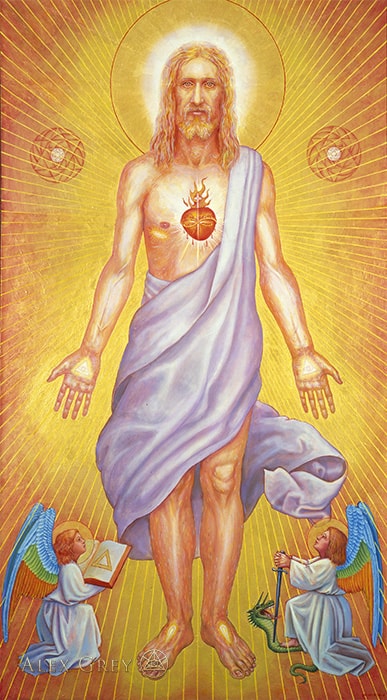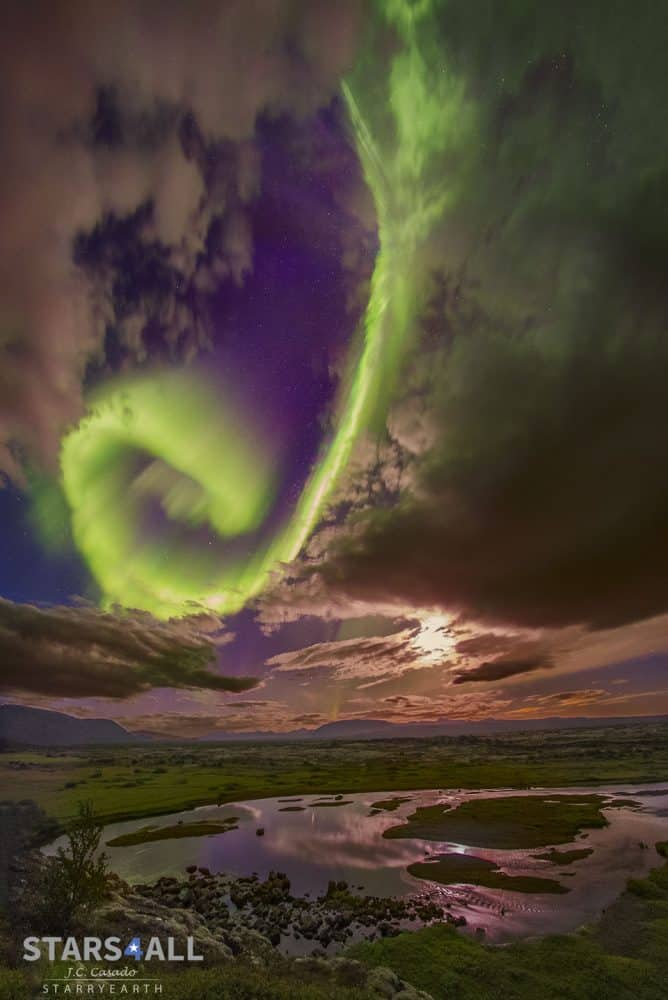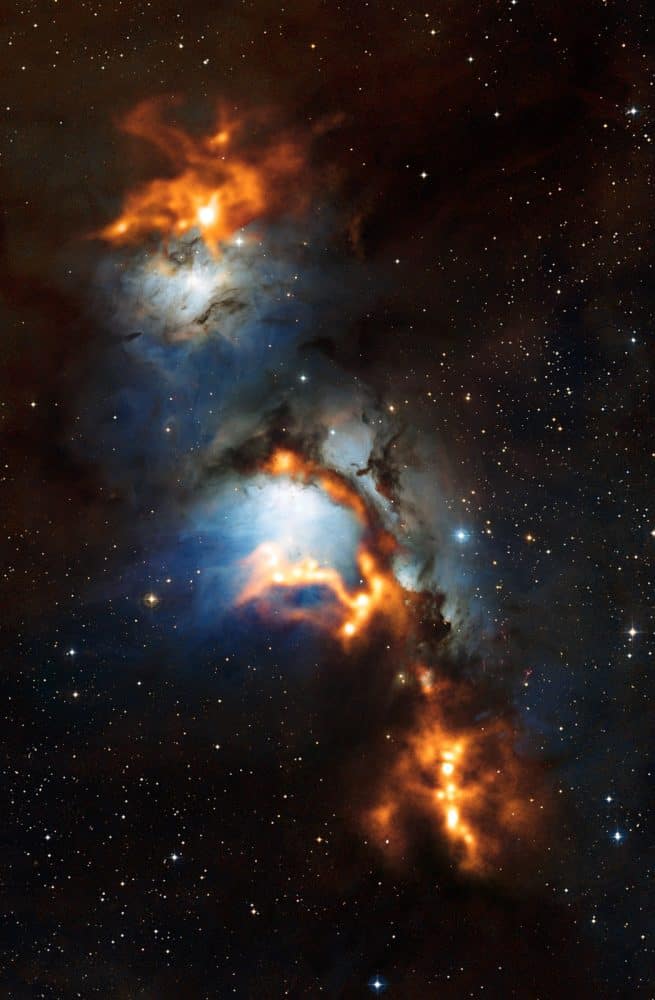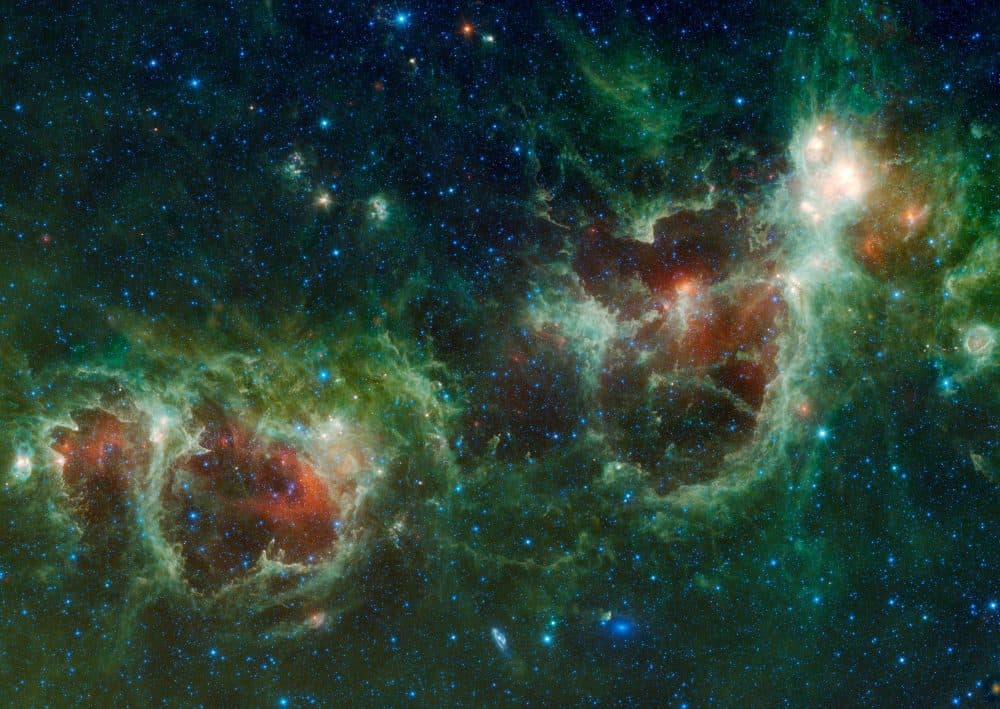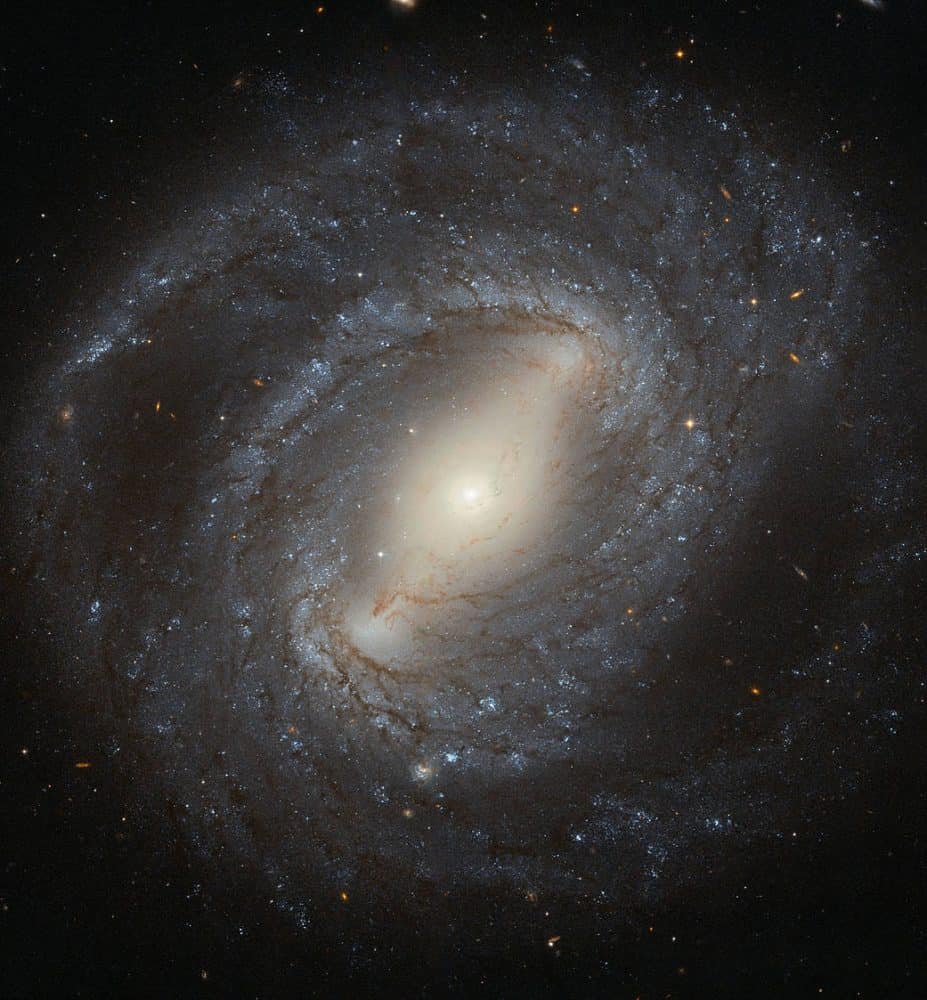Blog
The beauty is the aurora overhead, here taking the form of great green spiral, seen between picturesque clouds with the bright Moon to the side and stars in the background. The beast is the wave of charged particles that creates the aurora but might, one day, impair civilization. In 1859, following notable auroras seen all across the globe, a pulse of charged particles from a coronal mass ejection (CME) associated with a solar flare impacted Earth’s magnetosphere so forcefully that they created the Carrington Event. A relatively direct path between the Sun and the Earth might have been cleared by a preceding CME. What is sure is that the Carrington Event compressed the Earth’s magnetic field so violently that currents were created in telegraph wires so great that many wires sparked and gave telegraph operators shocks. Were a Carrington-class event to impact the Earth today, speculation holds that damage might occur to global power grids and electronics on a scale never yet experienced. The featured aurora was imaged in 2016 over Thingvallavatn Lake in Iceland, a lake that partly fills a fault that divides Earth’s large Eurasian and North American tectonic plates.
more...Locksley Wellington “Slide” Hampton (born April 21, 1932) is an American jazz trombonist, composer and arranger. Described by critics as a master composer, arranger and uniquely gifted trombone player, Hampton’s career is among the most distinguished in jazz. As his nickname implies, Hampton’s main instrument is slide trombone, but he also occasionally plays tuba and flugelhorn.
At the age of 12, Slide played in his family’s Indianapolis jazz band, The Duke Hampton Band. By 1952, at the age of 20, he was performing at Carnegie Hall with the Lionel Hampton Band. He played with the Buddy Johnson‘s R&Bband from 1955–1956, then became a member of Maynard Ferguson‘s band (1957–1959), where he played and arranged, providing excitement on such popular tunes as “The Fugue,” “Three Little Foxes” and “Slides Derangement.” In 1958, he recorded with trombone masters on the classic release of Melba Liston, “Melba Liston and Her ‘Bones”. As his reputation grew, he soon began working with bands led by Art Blakey, Tadd Dameron in 1969, Barry Harris, Thad Jones, Mel Lewis, and Max Roach, contributing both original compositions and arrangements. In 1962, he formed the Slide Hampton Octet, with horn players Freddie Hubbard, and George Coleman. The band toured the U.S. and Europe and recorded on several labels.
more...James Mundell Lowe (April 21, 1922 – December 2, 2017) was an American jazz guitarist who worked often in radio, television, and film, and as a session musician.
He produced film and TV scores in the 1970s, such as the Billy Jack soundtrack and music for Starsky and Hutch, and worked with André Previn‘s Trio in the 1990s.
The son of a Baptist minister, Lowe grew up on a farm in Shady Grove, Mississippi, near Laurel. He started playing guitar when he was eight years old, with his father and sister acting as his first teachers. When he was thirteen, he began running away from home to play in bands. Occasionally his father would find him, bring him home, and warn him about the dangers of whiskey. At sixteen, Lowe worked in Nashville on the Grand Ole Opry radio program. He was a member of the Jan Savitt orchestra before serving in the military during World War II.
At basic training, he became friends with John Hammond, who organized weekend jam sessions. He performed in an Army dance band while in Guadalcanal. After his discharge, he called Hammond, looking for work, and Hammond sent him to Ray McKinley.[1] He spent two years with McKinley’s big band in New York City. He joined the Benny Goodman orchestra, then worked intermittently for the next few years at Café Society and other clubs in New York.
In 1950, he was hired by NBC as a staff musician. He and Ed Shaughnessy were members of the Today Show band for over ten years. Lowe acted in an episode of the Armstrong Circle Theatre television show that included Walter Matthau and live music by Doc Severinsen.
On the weekends he played jazz, sometimes getting permission from NBC to leave for six-month periods. In the jazz world he played with Jimmy Dorsey and Tommy Dorsey, Bill Evans, Billie Holiday, Red Norvo, Charles Mingus, Charlie Parker, Sauter-Finegan Orchestra, and Lester Young. He composed and arranged for NBC. He was responsible for introducing pianist Bill Evans to record producer Orrin Keepnews, resulting in Evans’s first recordings as a leader.
more...https://www.youtube.com/watch?v=Lf6xw3MLRL4
more...Community Band rehearsal at East Phillips Park 2307 17th Ave S, Minneapolis 1-3pm Mayday Parade Band
more...This image of the region surrounding the reflection nebula Messier 78, just to the north of Orion’s belt, shows clouds of cosmic dust threaded through the nebula like a string of pearls. The submillimetre-wavelength observations, made with the Atacama Pathfinder Experiment (APEX) telescope and shown here in orange, use the heat glow of interstellar dust grains to show astronomers where new stars are being formed. They are overlaid on a view of the region in visible light.
Messier 78 or M 78, also known as NGC 2068, is a reflection nebula in the constellation Orion. It was discovered by Pierre Méchain in 1780 and included by Charles Messier in his catalog of comet-like objects that same year.
M78 is the brightest diffuse reflection nebula of a group of nebulae that includes NGC 2064, NGC 2067 and NGC 2071. This group belongs to the Orion B molecular cloud complex and is about 1,350 light-years distant from Earth. M78 is easily found in small telescopes as a hazy patch and involves two stars of 10th and 11th magnitude. These two B-type stars, HD 38563 Aand HD 38563 B, are responsible for making the cloud of dust in M78 visible by reflecting their light.
more...Stephen Robert Nesta “Raggamuffin” Marley (born April 20, 1972) is a Jamaican-American musician who is the son of Bob Marley and his wife Rita Marley. Stephen is an eight-time Grammy Award winner, three times as a solo artist, twice as a producer of younger brother Damian Marley’s ‘Halfway Tree’ and ‘Welcome to Jamrock’ albums, and a further three times as a member of Ziggy Marley & The Melody Makers.
His 2011 album Revelation Pt. 1 – The Root of Life won the Grammy Award for Best Reggae Album in 2012. The follow-up, Revelation Pt. 2 – The Fruit of Life was released on July 22, 2016.
In his self-produced solo albums Mind Control (2007), Mind Control Acoustic (2008), Revelation Part I: The Root of Life (2011) and Revelation Part II: The Fruit of Life (2016) Stephen has displayed artistic creativity previously associated with American legends such as Stevie Wonder and Prince; where the artiste composes and produces all the songs on his album, and plays a variety of the musical instruments himself.
more...Ernesto Antonio “Tito” Puente (April 20, 1923 – May 31, 2000) was an American musician, songwriter and record producer. The son of Ernest and Ercilia Puente, native Puerto Ricansliving in New York City’s Spanish Harlem, Puente is often credited as “The Musical Pope”, “El Rey de los Timbales” (The King of the Timbales) and “The King of Latin Music”. He is best known for dance-oriented mambo and Latin jazz compositions that endured over a 50-year career. He and his music appear in many films such as The Mambo Kings and Fernando Trueba‘s Calle 54. He guest-starred on several television shows, including Sesame Street and The Simpsons two-part episode “Who Shot Mr. Burns?“. His most famous song is “Oye Como Va“.
Tito Puente was born on April 20, 1923, at Harlem Hospital Center in the New York borough of Manhattan. His family moved frequently, but he spent the majority of his childhood in the Spanish Harlem area of the city. Puente’s father was the foreman at a razorblade factory.
more...Lionel Leo Hampton (April 20, 1908 – August 31, 2002) was an American jazz vibraphonist, pianist, percussionist, and bandleader. Hampton worked with jazz musicians from Teddy Wilson, Benny Goodman, and Buddy Rich to Charlie Parker, Charles Mingus, and Quincy Jones. In 1992, he was inducted into the Alabama Jazz Hall of Fame, and was awarded the National Medal of Arts in 1996. Lionel Hampton was born in 1908 in Louisville, Kentucky, and was raised by his mother. Shortly after he was born, he and his mother moved to her hometown of Birmingham, Alabama. He spent his early childhood in Kenosha, Wisconsin, before he and his family moved to Chicago, Illinois, in 1916. As a youth, Hampton was a member of the Bud Billiken Club, an alternative to the Boy Scouts of America, which was off-limits because of racial segregation. During the 1920s, while still a teenager, Hampton took xylophone lessons from Jimmy Bertrand and began to play drums. Hampton was raised Roman Catholic, and started out playing fife and drum at the Holy Rosary Academy near Chicago.
more...https://www.youtube.com/watch?v=53VV-IM67BM
more...The Heart and Soul nebulae are seen in this infrared mosaic from NASA’s Wide-field Infrared Survey Explorer, or WISE. The image covers an area of the sky over ten times as wide as the full moon and eight times as high (5.5 x 3.9 degrees) in the constellation Cassiopeia.
Located about 6,000 light-years from Earth, the Heart and Soul nebulae form a vast star-forming complex that makes up part of the Perseus spiral arm of our Milky Way galaxy. The nebula to the right is the Heart, designated IC 1805 and named after its resemblance to a human heart. To the left is the Soul nebula, also known as the Embryo nebula, IC 1848 or W5. The Perseus arm lies further from the center of the Milky Way than the arm that contains our sun. The Heart and Soul nebulae stretch out nearly 580 light-years across, covering a small portion of the diameter of the Milky Way, which is roughly 100,000 light-years across.
The two nebulae are both massive star-making factories, marked by giant bubbles that were blown into surrounding dust by radiation and winds from the stars. WISE’s infrared vision allows it to see into the cooler and dustier crevices of clouds like these, where gas and dust are just beginning to collect into new stars. These stars are less than a few million of years old — youngsters in comparison to stars like the sun, which is nearly 5 billion years old.
Also visible near the bottom of this image are two galaxies, Maffei 1 and Maffei 2. Both galaxies contain billions of stars and, at about 10 million light-years away, are well outside our Milky Way yet relatively close compared to most galaxies. Maffei 1 is the bluish elliptical object and Maffei 2 is the spiral galaxy.
All four infrared detectors aboard WISE were used to make this image. Color is representational: blue and cyan represent infrared light at wavelengths of 3.4 and 4.6 microns, which is dominated by light from stars. Green and red represent light at 12 and 22 microns, which is mostly light from warm dust.
more...George Bernard “Bernie” Worrell, Jr. (April 19, 1944 – June 24, 2016) was an American keyboardist and composer best known as a founding member of Parliament-Funkadelicand for his work with Talking Heads. He is a member of the Rock and Roll Hall of Fame, inducted in 1997 with fifteen other members of Parliament-Funkadelic. Worrell was described by Jon Pareles of The New York Times as “the kind of sideman who is as influential as some bandleaders.”
Worrell was born in Long Branch, New Jersey, and grew up in Plainfield, New Jersey, where his family moved when he was eight.[1] A musical prodigy, he began formal piano lessons by age three and wrote a concerto at age eight. He went on to study at the Juilliard School and received a degree from the New England Conservatory of Music in 1967. As a college student, Worrell played with a group called Chubby & The Turnpikes; this ensemble eventually evolved into Tavares.
After meeting George Clinton, leader of a Plainfield-based doo wop group called The Parliaments, Worrell, Clinton, The Parliaments and their backing band, The Funkadelics, moved to Detroit, Michigan; thereafter, both groups became collectively known as Parliament-Funkadelic. During the 1970s the same group of musicians separately recorded under the names Parliament and Funkadelic, (among several others), but toured as P-Funk. Worrell played grand piano, Wurlitzer electric piano, Hohner Clavinet, Hammond B3 organ, ARP String Ensemble and Moog synthesizer, co-wrote, and wrote horn and rhythm arrangements on hit recordings for both groups and other associated bands under the “Parliafunkadelicment Thang” production company, and many of his most notable performances were recorded with Bootsy’s Rubber Band, Parlet, The Brides of Funkenstein and The Horny Horns. Worrell recorded a 1978 solo album, All the Woo in the World, with the musical backing of P-Funk’s members.
more...Dudley Stuart John Moore, CBE (19 April 1935 – 27 March 2002) was an English actor, comedian, musician and composer.
Moore first came to prominence in the UK as one of the four writer-performers in the comedy revue Beyond the Fringe from 1960, and with one member of that team, Peter Cook, collaborated on the television series Not Only… But Also. The double act worked on other projects until the mid-1970s, by which time Moore had settled in Los Angeles to concentrate on his film acting.
His solo career as a comedy film actor was heightened by the success of hit Hollywood films, particularly Foul Play (1978), 10 (1979) and Arthur (1981). For Arthur, Moore was nominated for the Academy Award for Best Actor and won a Golden Globe Award. He received a second Golden Globe for his performance in Micki & Maude (1984).
more...Flamenco Fridays with Fandango. The current 3/4 pattern of the fandango, its distinctive progression (i–iv–V) lyrics with octosyllabic verses and the use of castanets and guitars are well-documented from the 18th century.
The fandangos grandes (big fandangos) are normally danced by couples, which start out slowly with gradually increasing tempo. Many varieties are derived from this one.
The fandanguillos (little fandangos) are livelier, more festive derivations of fandangos. Some regions of Spain have developed their own style of fandangos, such as Huelva (fandangos de Huelva) and Málaga (fandangos de Málaga, or Verdiales). Northern areas such as the Principality of Asturias, the Basque Country and Castile and León have preserved a more relaxed performance.
more...Voices of Sepharad on Maundy Thursday 4-18-19
Washing of the Feet Celebration for Easter Week
Voices of Sepharad performing Maundy Thursday at Westminster Presbyterian in Westminster Hall in the new section 530-630pm
with David Harris, David Burk and the undavid mick laBriola
https://www.westminstermpls.org
Discovered in 1784 by the German–British astronomer William Herschel, NGC 4394 is a barred spiral galaxy situated about 55 million light-years from Earth. The galaxy lies in the constellation of Coma Berenices (Berenice’s Hair) and is considered to be a member of the Virgo Cluster.
NGC 4394 is the archetypal barred spiral galaxy, with bright spiral arms emerging from the ends of a bar that cuts through the galaxy’s central bulge. These arms are peppered with young blue stars, dark filaments of cosmic dust, and bright, fuzzy regions of active star formation. At the center of NGC 4394 lies a region of ionized gas known as a low-ionization nuclear emission-line region (LINER). LINERs are active regions that display a characteristic set of emission lines in their spectra— mostly from weakly ionized atoms of oxygen, nitrogen and sulphur.
Although LINER galaxies are relatively common, it’s still unclear where the energy comes from to ionize the gas. In most cases it is thought to be the influence of a black hole at the center of the galaxy, but it could also be the result of a high level of star formation. In the case of NGC 4394, it is likely that gravitational interaction with a nearby neighbor has caused gas to flow into the galaxy’s central region, providing a new reservoir of material to fuel the black hole or to make new stars.
more...More Posts
- World Music with Tigran Hamasyan
- Daily Roots with Natural Idren
- The Cosmos with IC 1318
- Charlie Watts
- Ahmad Jamal
- Milwaukee Slim
- Flamenco Fridays with Reyes Gitanos
- Daily Roots with the Eternals
- The Cosmos with Sh2-273
- Sameer Gupta
- James Cotton
- Rashied Ali
- Willie Dixon
- World Music with Ayarkhaan (АЙАРХААН)
- Daily Roots with Cornell Campbell
- The Cosmos with the First Stars
- Stanley Clarke
- Andrew Hill
- Lena Horn
- World Music with Al Bilali Soudan
